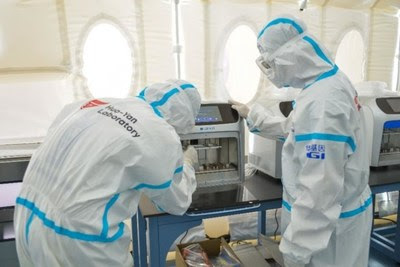Fast and accurate testing labs at international terminals offer a new solution, as airports continue to be a focal point in the global spread of COVID-19
SHENZHEN, China, Sept. 3, 2021 /PRNewswire/ — From April to August, 2021, BGI’s COVID-19 testing lab has helped 5,500 Chinese travelers safely fly out of the Addis Ababa Bole International Airport. In April, BGI set up the “Huo-Yan” laboratory, a COVID-19 testing lab, at the airport for passengers flying to China in cooperation with Ethiopia Airlines. Since then, the lab has contributed to around five consecutive months without a single flight suspension on the route.
The pre-flight testing procedures pioneered at the lab present an option for reducing the pressure of containment measures at destinations.

The lab provides quick, accurate nucleic acid polymerase chain reaction (PCR) testing and antibody testing services to passengers at the Airport. The lab can test up to 400 samples within three hours and 5,000 samples per day, reducing inconvenience for departing and transiting at the Airport.
The lab helps reduce imported cases. Passengers are required to quarantine first. They are not allowed to board until obtaining negative results for both a COVID-19 nucleic acid PCR test and an antibody test.
Since the start of operations at the lab, the number of outbound positive cases found on arrival has sharply decreased. To date, no flights have been suspended between Ethiopia and China, making this the only direct flight from the African continent to China that has been continuously operating during this period.

“From April 21 to August 31, the laboratory has provided testing services for more than 5,500 passengers on 19 flights to China,” said Chen Songheng, the head of the “Huo-Yan” laboratory in Ethiopia.
BGI has built more than 30 “Huo-Yan” laboratories with partners in over 80 countries and regions. By providing one-platform solutions with accurate, efficient testing, the labs play a vital role in contributing to the global fight against the COVID-19 pandemic.
BGI leads innovative development in genomics and life sciences. Through its integrated model, it incorporates industry development, education and research in compliance with international bioethical protocols. It applies frontier multi-omics research findings to areas including medicine, healthcare and resource conservation, and provides cutting-edge proprietary life science instruments and devices, technical support and solutions to revolutionize the current healthcare system towards precision medicine and healthcare.
Photo – https://mma.prnewswire.com/
Logo – https://mma.prnewswire.com/
